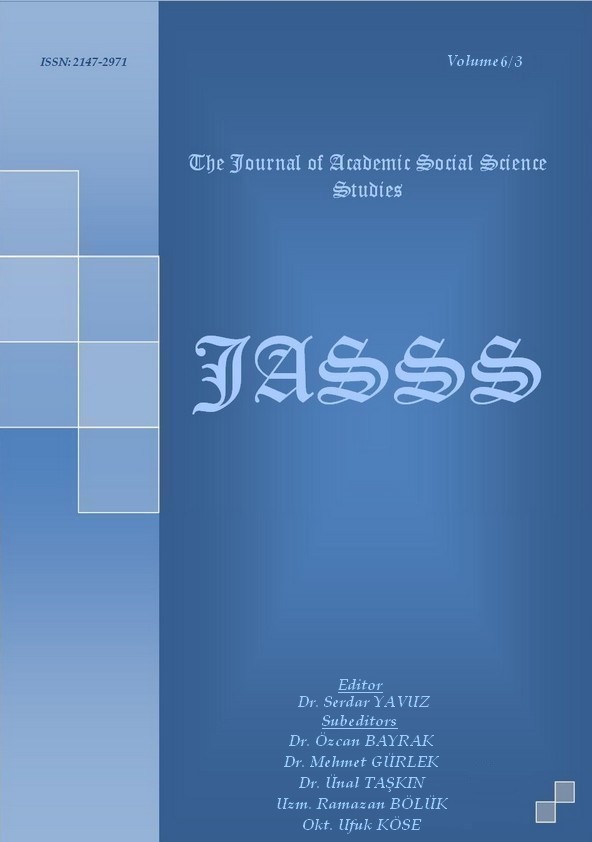İLKÖĞRETİM SOSYAL BİLGİLER 4. VE 5. SINIF ÜNİTE KAZANIMLARI İLE DERS KİTAPLARI HAZIRLIK VE DEĞERLENDİRME SORULARININ BİLİŞSEL, DUYUŞSAL VE PSİKOMOTOR HEDEFLER AÇISINDAN KARŞILAŞTIRILMASI
Author :
Abstract
Bu araştırmanın amacı, ilköğretim 4. ve 5. Sosyal Bilgiler ünite kazanımlarıyla, ders kitapları hazırlık ve değerlendirme sorularının bilişsel, duyuşsal ve psikomotor hedefler açısından örtüşüp örtüşmediğini belirlemektir. Araştırmada bu amaçla Sosyal Bilgiler 4. ve 5. sınıf kazanımları ile Milli Eğitim Bakanlığı (MEB) Talim ve Terbiye Kurulu tarafından 2005-2006 yılından itibaren 5 yıl süreyle okutulması kararlaştırılan (2011-2012 yılına kadar) 4. ve 5. sınıf Sosyal Bilgiler ders kitabı hazırlık ve değerlendirme soruları analiz edilmiştir. Yapılan analiz sonucunda 4.sınıf kazanımların % 78’i bilişsel gruba, % 20’si duyuşsal gruba ve % 2’si psikomotor alana girdiği, 5. sınıf kazanımların ise % 78’i bilişsel, % 22’si duyuşsal alana girdiği görülmüştür. MEB’e ait 4. ve 5. sınıf ders kitapları hazırlık ve değerlendirme sorularının özellikle duyuşsal alanda kazanımlarla örtüşmediği (MEB 4. sınıf hazırlık soruları %4 duyuşsal, 5. sınıf %7 duyuşsal ve değerlendirme soruları 4. sınıf %8 duyuşsal, 5. sınıf %3 duyuşsal); Kolukısa, Oruç, Akbaba, Dündar, (2008) tarafından hazırlanan özel yayınevine ait 4. sınıf ders kitabında duyuşsal alanla ilgili sorulara yeterli oranda yer verildiği (hazırlık soruları %21 duyuşsal ve değerlendirme soruları %15 duyuşsal); Gülcan, Bayram, Kılıç, Karakaya ve Midilli (2008) tarafından hazırlanan özel yayınevine ait 5. sınıf ders kitabında ise duyuşsal alanla ilgili sorulara yeterli oranda yer verilmediği (hazırlık soruları %9 duyuşsal ve değerlendirme soruları %4 duyuşsal) yani ders kitabındaki hazırlık ve değerlendirme sorularının programda yer alan kazanımlarla taksonomik olarak örtüşmediği görülmüştür. Bu bulgular dikkate alındığında ders kitapları hazırlanırken Ders kitapları hazırlık ve ünite değerlendirme sorularının ünite kazanımları ile taksonomik olarak örtüşmesine dikkat edilmesi gerektiği söylenebilir.
Keywords
Abstract
The purpose of this study, to determine coincide with whether primary school fourth and fifth grade social studies unit acquisition and textbooks’ preparatory and assessment questions in terms of cognitive, affective and psychomotor aims. In this study, fourth and fifth grade social studies textbook, preparatory and assessment questions were analyzed which was accepted by Turkish Ministry of National Education Board of Education for 2005 to 2012. The results of the analysis, 78% of the fourth grade acquisitions are placed in cognitive domain, 20% of them are placed in affective domain, and 2% of them are placed in psychomotor domain. In fifth grade acquisiitons, 78% of them are placed in cognitive domain and 22% of them placed in affective domain. Preparatory and assessment questions in fourth and fifth grade textbook, especially in affective domain were not coherent with acquisitions. 4% of the preparatory questions were affective in fourth grade, 7% of the preparatory questions were affective in fifth grade; 8% of the assessment questions were affective in fourth grade and 3% of the assessment questions were affective domain in fifth grade in Turkish Ministry of National Education Social Studies Textbook. Written by Kolukısa, Oruç, Akbaba and Dündar (2008) fourth grade social studies textbook include questions related to affective domain as it should be (21% of the preparatory questions were affective domain and 15% of the assessment questions were affective domain). Written by Gülcan, Bayram, Kılıç, Karakaya ve Midilli (2008) fifth grade social studies textbook include questions related to affective domain was wrong (9% of the preparatory questions were affective and 4% of the assessment questions were affective. Namely, preparatory and assessment questions in textbooks were not coherent with acquisitions in social studies programme as taxonomically. When it is considered these findings, textbook writers should take into account to be textbooks preparatory and assessment questions coherent with unit acquisitons as taxonomically.
